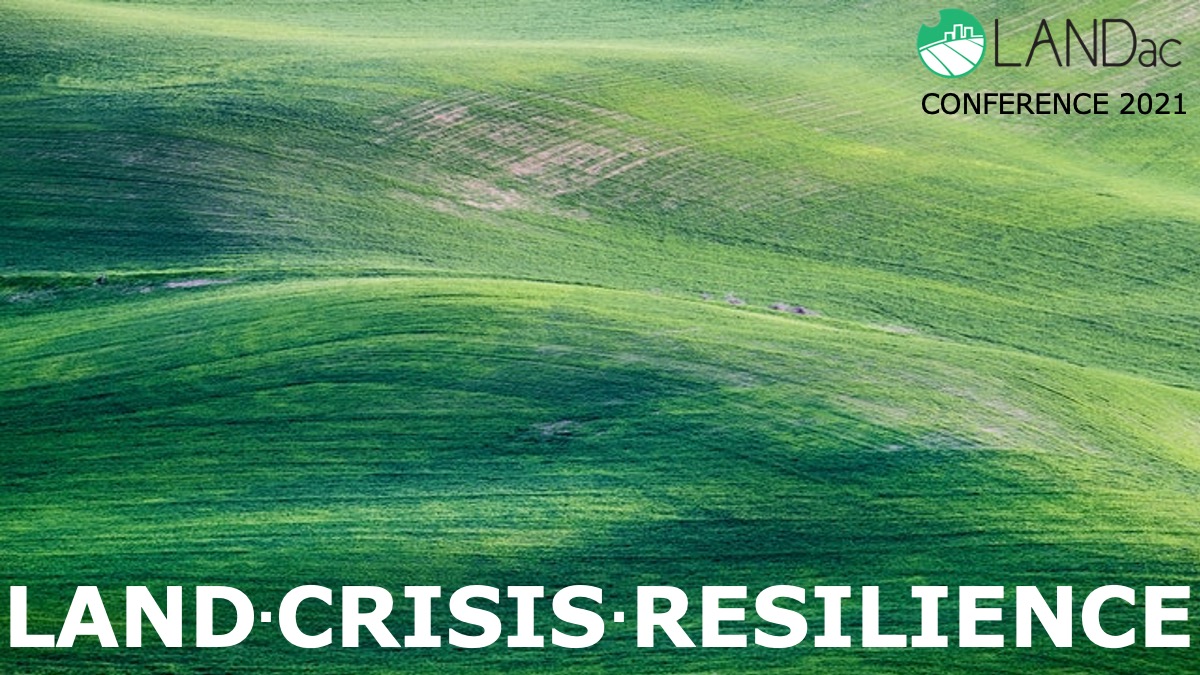The LANDac Conference 2021 was opened by the Co-Chairs of LANDac, Dr. Gemma van der Haar from Wageningen University and Dr. Guus van Westen from Utrecht University. Dr. Guus van Westen noted that theirs is the 11th consecutive LANDac conference, and that last year, labeling the conference an Online Encounter, we were not yet ready to accept the new reality of COVID-19. This shift has enabled LANDac to reach new audiences that were not previously part of the LANDac crowd.
The theme of the conference this year was Land, Crisis and Resilience, due to the realization that different crises may intersect and have a ripple effect upon health, livelihoods, natural resource management, land conflicts and more. These crises may open windows of opportunity for change and innovations. Dr. van Westen underscored the importance of LANDac initiatives, including the Summer School on land governance, the network of local professionals and the new knowledge management program for the Land-At-Scale program of the Dutch government that aims at sustainable land governance in a range of countries. Dr. Gemma van der Haar, Co-Chair of LANDac, also shared her enthusiasm for a successful meeting rich in content, leading to many new ideas.
They passed the microphone to Professor Dr. Richard Sliuzas, Professor of Urban Planning for Disaster Risk Reduction at the University of Twente, to Chair the keynote session. He introduced the keynote speakers: Dr. Shuaib Lwasa, a Principal Researcher on Governance at the Global Center on Adaptation and Dr. Wytske Chamberlain with Land Matrix Africa RFP, hosted by the University of Pretoria.
Dr. Lwasa addressed the complexity of land tenure management in several African cities, noting land policies are very incoherent, with traditional land systems woven into the legacy of current urbanization in Africa. He shared the example of Uganda, where there are many disputes around land rights represented by public entities like municipalities or agencies that govern different aspects of the city or the country with linkages between land tenure, money, and the management of land itself. He discussed how to reduce the risk of climate induced impacts, for example from flash floods, through a nuanced understanding of social and economic issues in the city between communities and different land actors with municipalities. He suggested that the crises exist due to the failure of public institutions to properly manage land and overlapping rights of communities. Dr. Lwasa underscored that public policies, some of which are actually contradictory to each other, have enabled or inhibited conveyance of land.
Dr. Lwasa suggested that the wielding of power by a particular entity or an individual can and does end up as a selective guarantee of protection of rights of one entity or group of actors, and to the disenfranchisement of the others.
These factors interact with climate induced impacts, such as involuntary resettlement or eviction. The IPCC indicated there is an increasing likelihood that climate change has impacts on multiple systems in Africa, and in particular cities, which will be affected by extreme weather events and heat waves, as well as water availability; some cities are drenched with water, while others have no water at all. Dr. Lwasa noted that we are starting to experience the future, and this is not only impacting large cities, but small and medium cities alike.
Dr. Lwasa then showed how climate impacts are interacting with the land crisis in the city to exacerbate vulnerabilities for flash floods. Land market and land management policies are inhibiting efficient and affordable access to land by households as well as public agencies that need it to build infrastructure. He said there is a disjuncture between the public and private interests in land when it comes to managing urban infrastructure. This is due to conflicts surrounding how land is valued and who will be compensated for its sale, with multiple layers of interests, often on the same piece of land, which affects response options to the climate crisis.
He discussed the tension between individual ownership of land and public entities. The former wants to maximize their economic value, while the latter focuses on infrastructure, such as drainage and roads.
“There is a need to rethink resilience, not as a universal order, but resilience that is contextualized and encapsulated around the cultural and socio economic as well as demographic issues of a particular settlement.”
Dr. Lwasa concluded that when it comes to land, it is very much a local and cultural issue in many African cities, and that the issues must be contextualized to design policies and build resilient systems that address climate impacts, while transcending a cost-benefit analysis.
Dr. Wytske Chamberlain then addressed large-scale land acquisitions over the past decade of the global land rush, and efforts to make sure that these large-scale land acquisitions become more inclusive, responsible, and sustainable for the communities in which they take place. Dr. Chamberlain recounted how 10 years ago there was a triple crisis, with a global financial crisis, a food price crisis, and a fuel crisis from rising oil prices, leading many countries to implement biofuel policies. These three crises sparked an interest in land and agriculture in developing countries, and land was seen as abundant.
She outlined how the Land Matrix has engaged in a decade of intensive data collection that demonstrated from 2007-2008 land acquisitions took off as a result of these crises. The Land Matrix has reported 1500 deals that have been concluded, which cover an area of about 13 million hectares, or an area the size of Italy or the Philippines. Recently, the number of land acquisitions have stabilized, as oil and food prices have fallen, stock markets have recovered, and policies surrounding land acquisitions, including moratoriums in certain countries and the elimination of biofuel targets have been instituted.
Their research has also demonstrated that many of the land investments do not materialize due to management mistakes and misguided expectations. They also showed that projects on land formerly occupied by smallholders and pastoralists have high likelihood of failure and to generate conflict. Furthermore, they have discovered that the impacts of land acquisitions are more profound when land governance systems are weak, which leads to more vulnerable segments of the community losing out.
Dr. Chamberlain indicated that negative impacts of large-scale land acquisitions forced governments across the developing world to implement policy changes. For example, Malawi established a law that allows customary land to be registered, and moratoriums have been implemented in Liberia, Ukraine Cambodia and other countries. Moreover, the Voluntary Guidelines on the Governance of Tenure (VGGT) arose, which give practical guidance to governments, communities, and private investors. These frameworks have formed the basis for the Framework and Guidelines on Land Policy in Africa which were drawn up by the African Union, and ASEAN has also used these for formulating their guidelines on land. She also highlighted that multistakeholder platforms serve as a tool to assure that governments comply with policies relating to land management and investment.
Importantly, Dr. Chamberlain discussed the socioeconomic impacts of large-scale land acquisitions, which, in addition to inadequate compensation for communities, they often also lose access to resources and the spin off effects can also be disappointing. In terms of job creation, plantations lead to precarious contracts often of a temporary nature, and workers are underpaid and work in difficult conditions. She suggested, however, that some positive examples exist, such as in the horticulture sector in Kenya, where a majority of workers have a contract and permanent employment, or in Mozambique, where wages are higher than alternative jobs.
She highlighted that smallholder farmers experienced negative effects from competition for scarce water sources. Moreover, she stated that many examples exist where investors incorrectly assume that communities agree with their plans, simply because national government officials or traditional leaders agree. Governments may prioritize large-scale investments to the detriment of smallholder farmers. Dr. Chamberlain remarked that governments need to draw up a more holistic approach that brings in the private sector, civil society and farmers' organizations in policy decisions, noting that multistakeholder platforms may be an avenue for achieving inclusive decision making.
She concluded by noting that over the last year food prices have increased by 40% due to COVID-19, and that the crisis has been used by governments to push through policies under the banner of economic recovery. Dr. Chamberlain indicated that there are signs of a new land rush in the making, suggesting that it is becoming increasingly urgent to create a resilient context for more equitable, fair and sustainable investments in agriculture.


